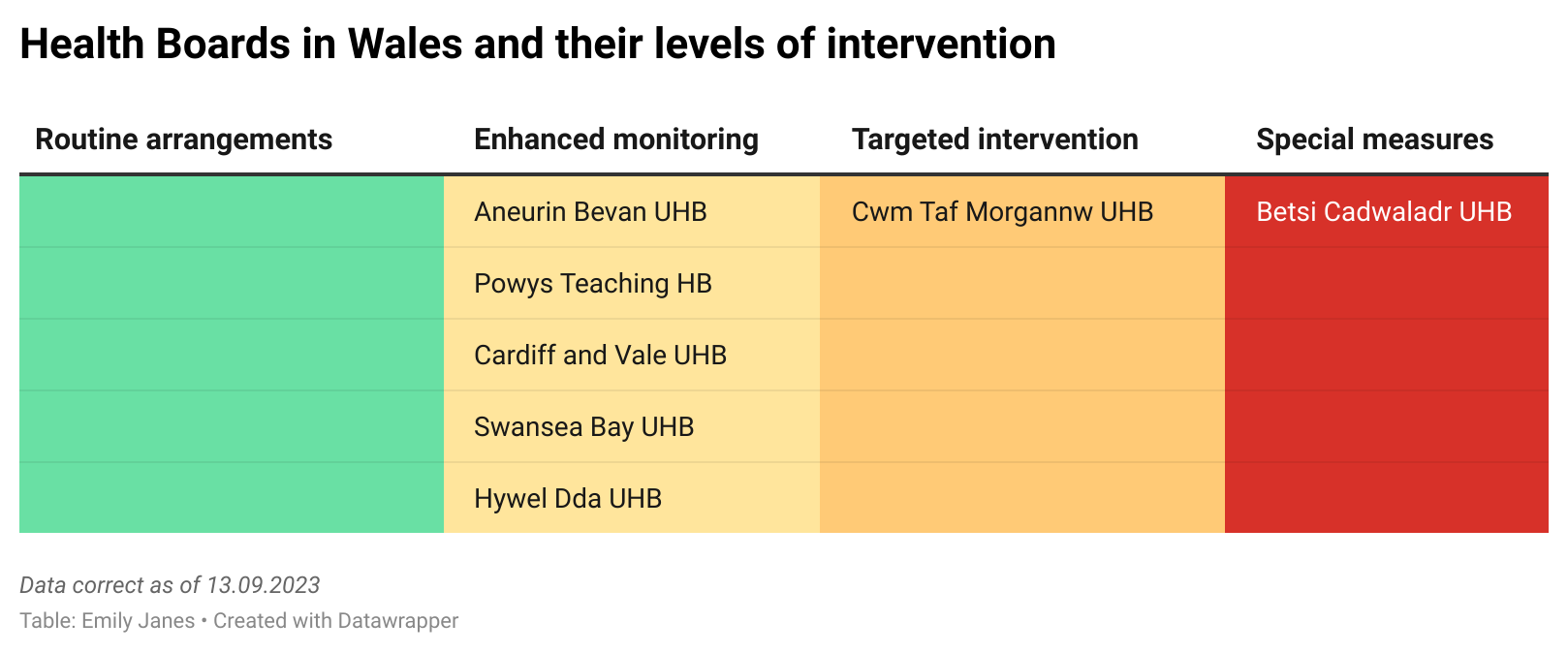Support quality, independent, local journalism…that matters
From just £1 a month you can help fund our work – and use our website without adverts. Become a member today

Aneurin Bevan University Health Board (ABUHB) has said that “very difficult decisions” lie ahead after the Welsh Government placed it under greater financial scrutiny.
On September 13, ABUHB was placed under “enhanced monitoring” by the Welsh Government due to concerns about “extreme” challenges facing all health boards in Wales.
Prior to the announcement, ABUHB and Powys Health Board were the only health boards on the lowest level of scrutiny – routine arrangements – meaning it was business as usual.
Now, all health boards in Wales are now subject to one of three escalated measures – enhanced monitoring, targeted intervention, or special measures.

A recent report from public spending watchdog Audit Wales revealed all of Wales’ health boards had a combined deficit of £151.9 million during the 2022/23 fiscal year.
For context, the Welsh Government spends more than £10bn a year on health and social care – almost 50% of its entire budget.
A spokesman for Aneurin Bevan University Health Board told Caerphilly Observer: “Like every other Health Board in Wales, we are facing the biggest financial challenge we have ever experienced and are doing everything we can to make efficiency savings without compromising the safety of our patients and communities.
“We currently have a forecast financial deficit of £112m for 2023/24 with current costs running above that level. This has been driven primarily by rising costs over the last few years through the Covid-19 pandemic, increased demand for NHS services, rising market prices, high variable pay costs due to workforce challenges and the extra resources we are using to catch up on waiting times following the disruption caused by the pandemic.
“Our financial position means that we will need to take very difficult decisions to control and cut costs in the months ahead. We are working through our plans and have identified further savings initiatives that will be progressed with pace.
“We would like to reassure people that the very best interests of our patients, communities and NHS staff are being considered as we make difficult decisions to reduce health board spending.”
Health boards are facing extreme financial challenges caused by years of UK Government austerity measures and record levels of inflation, according to the Welsh Government.

Speaking about the decision to increase scrutiny, Wales’ health minister Eluned Morgan said: “We do not make these decisions lightly and it reflects the very difficult financial position we are in, as a result of inflation and austerity, and the challenges affecting health boards.
“We are seeing operational pressures, long waiting lists, and an extremely challenging financial position in the NHS – but this is not unique to Wales.”
She continued: “We will support health boards to improve their financial planning positions, but some difficult decisions will need to be made as we work through this very tough financial challenge.
“In the coming weeks and months, together with the NHS, we will be working with the public to outline where savings need to be made to reduce these significant budget deficits.”
What do the escalation levels mean?
- Routine arrangements: this effectively means business as usual
- Enhanced monitoring: a proactive response led by the NHS body to put effective processing in place to drive improvement. It is closely monitored, challenged, and reviewed by Welsh Government and external review bodies
- Targeted intervention: co-ordinated and/or unilateral action to strengthen the capacity and capability of the NHS body to drive improvements
- Special Measures: measures identified when the current arrangements need significant change. Welsh Ministers may intervene as set out in the NHS (Wales) Act 2006
Source: research.senedd.wales
Criticism came from the Welsh Conservatives and Plaid Cymru in response to the announcement.
Welsh Conservative shadow health minister, Russell George MS, said: “This is a sad indictment of the state of our Labour-run Welsh NHS.”
“While it is positive that the Labour health minister is taking some action by acknowledging the dire state of our Welsh NHS, I have little faith given the lack of improvements we are seeing in health boards already being monitored that much will change in the coming months.”
Plaid Cymru’s health and care spokesperson, Mabon ap Gwynfor MS, said: “All health boards in Wales are now in some form of escalated measures. This is serious.
“For the government to publish this as a written statement with no opportunity for immediate Senedd scrutiny is a cynical move by a minister that seems to have lost grip on the entire situation. It should not have taken until now for the minister to realise the gravity of the situation health boards were in and to take action.
Support quality, independent, local journalism…that matters
From just £1 a month you can help fund our work – and use our website without adverts.
Become a member today
